It's a timely message. Many of Africa's youth are perishing, risking their lives in perilous journeys across the Sahara desert on their way to Europe. Some get stranded and die of thirst in the desert. Others fall into the hands of kidnappers who sell them into slavery in Libya, as a recent CNN investigation discovered. Twenty-six young girls, thought to be from Nigeria, recently died on a perilous crossing to Italy.October 2017
October 2017
A CNN team travels to Libya and witnesses a dozen men auctioned — some for as little as $400 each. The crew is also told of auctions taking place at nine locations in the country.
November 14, 2017
November 14, 2017
CNN publishes an exclusive report exposing how migrants are being sold by smugglers. In addition to alerting the Libyan authorities, CNN hands over footage as evidence to the International Criminal Court.
November 17, 2017
November 17, 2017
Libya opens an investigation into slave markets operating in the country following CNN's exclusive report. The probe is being overseen by the government's Anti-Illegal Immigration Agency. The International Organization for Migration (IOM), an intergovernmental organization based in Geneva that focuses on managing migration, welcomes Libya's investigation but warns that "the smuggling networks are becoming stronger, more organized and better equipped."
November 19, 2017
November 19, 2017
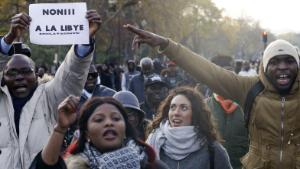
Protesters gather near the Libyan Embassy in central Paris to denounce the slave auctions and urge authorities to act quickly. Later that day, soccer star Paul Pogba celebrates his goal for Manchester United with a handcuff gesture highlighting the plight of migrants in Libya.
November 20, 2017
November 20, 2017
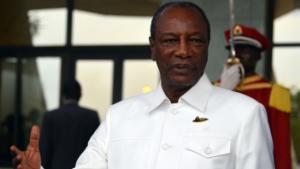
Alpha Conde, president of the African Union, and Federica Mogherini, the European Union's foreign policy chief, pledge in a joint news release to assist Libya in swiftly combating the issue of human traffickers.
November 20, 2017
November 20, 2017
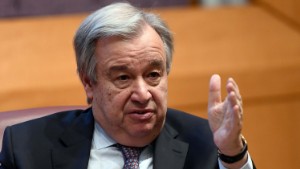
UN Secretary-General Antonio Guterres says he is "horrified" by the reports of African migrants sold as slaves. He says the footage demonstrates some of "the most egregious abuses of human rights" and may amount to crimes against humanity.
November 21, 2017
November 21, 2017
The UN-backed Libyan Government of National Accord, or GNA, say they are keen to address violations against illegal immigrants but argued that the international community — and countries from which migrants travel — should also take responsibility.
November 21, 2017
November 21, 2017
A Nigerian official tells CNN that repatriation of migrants from Libya is not a straightforward procedure before adding that the Nigerian government is working with authorities in Libya and the IOM to speed up the process.
November 22, 2017
November 22, 2017
France's President Emmanuel Macron calls the practice of selling migrants as slaves "a crime against humanity" and vows to press for sanctions. France calls for an "urgent" meeting of the UN Security Council to discuss this treatment of migrants in Libya, Foreign Minister Jean-Yves Le Drian says.</a>
November 22, 2017
November 22, 2017
Diplomats at a UN Security Council meeting on human trafficking call for an investigation that would hold the perpetrators of slave auctions in Libya accountable. The council also adopts a resolution designed to clamp down on human trafficking and slavery.
November 22, 2017
November 22, 2017
Spain's foreign ministry expresses its "deep concern" over CNN's report. Spain urges Libya to follow the UN Convention against Transnational Organized Crime and its protocol on human trafficking, the Spanish Foreign Ministry posts on its official Twitter account.
November 23, 2017
November 23, 2017
African Union chairman Moussa Faki Mahamat tells CNN the situation in Libya is a "shared responsibility" that stems from the ensuing chaos after Moammar Gadhafi was ousted. He says that an AU representative has been sent to Libya to see what measures should be taken. Mahamat says he has asked the African commission on human rights to open an investigation so "concrete steps (can) be taken."
According to Oxfam International, 80,000 to 150,000 people made their way across the harsh northeastern Niger zone of the desert to Europe in 2015. Around 71,000 migrants made it to Europe by sea just five months into 2017, a UN Migration Agency report said. The migrants all have one thing in common: they search for greener pastures elsewhere when home holds no hope.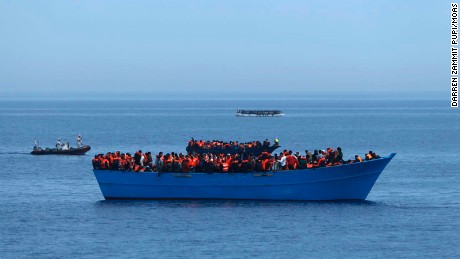 Masiyiwa, the founder and CEO of Econet Wireless, a pan-African telecoms company, is putting his money where his mouth is by traveling across the continent in a series of townhalls where he directly connects and engages with young people.
Masiyiwa, the founder and CEO of Econet Wireless, a pan-African telecoms company, is putting his money where his mouth is by traveling across the continent in a series of townhalls where he directly connects and engages with young people. 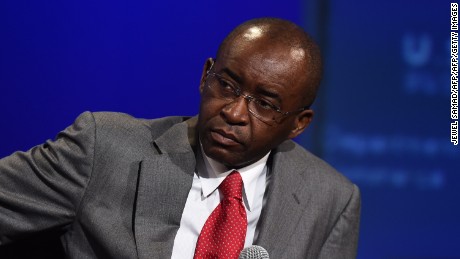 At one townhall held in Lagos, Nigeria in September, Masiyiwa was so taken with one young entrepreneur's business idea that he donated $100,000.
At one townhall held in Lagos, Nigeria in September, Masiyiwa was so taken with one young entrepreneur's business idea that he donated $100,000.
Responding to the crisis
"I believe sharing ideas with each other is so important to the future of the African continent," Masiyiwa — who is worth an estimated $280m — says. By teaching young Africans to be self-reliant and proactive, the telecoms tycoon is encouraging them to stay in their countries and contribute to the development of the continent."I realized that if we don't do something to help young people create jobs in the African economy… that Africa's progress would be reversed.""I understand we face the problem of corruption, bribery, bad policies," he says. "But it doesn't mean you should take to crossing the Sahara or the Mediterranean.""We see the drownings… in the Mediterranean, young people trying to get to Europe," he adds. "So this is my own way as well to try to respond to that crisis which is to say, 'hey' to young people. 'Listen, let's do something. We can create jobs. You can be entrepreneurs, or you can work for entrepreneurs. You don't have to take this incredible risk.'"
Most influential business leader on Facebook
Masiyiwa has taken his message directly to the youth by mentoring and influencing entrepreneurs on Facebook. He started posting business insights on Facebook after his daughter encouraged him to share some advice he gave her with a larger audience.Today, Masiyiwa has nearly three million followers on the platform and for 12 consecutive months he ranked as the most influential business leader on Facebook, according to social monitoring platform Crowdtangle.From how to spot new business opportunities to how to manage successful businesses or survive the challenges of running one, his Facebook posts propose practical new ways of dealing with entrepreneurial challenges in Africa.He posts once a week on average and tries to respond to as many comments as possible."Every comment that I select, I answer as though the person were in my office," he says.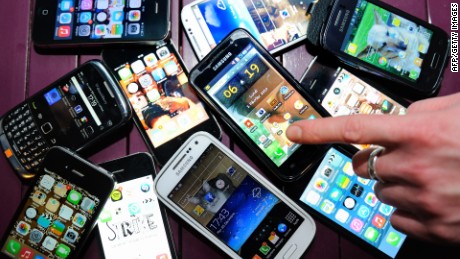 An average post on his Facebook page has over one million likes and thousands of comments and shares."I read the thousands of comments myself, and try to engage back directly as much as my schedule allows," Masiyiwa says. "I write every post myself. I'm very prayerful and contemplative about each post because I'm mindful of the fact that I am addressing the next generation of leaders."Masiyiwa and his wife Tsitsi are devout Christians who have committed a portion of their income to philanthropy and charitable giving. This includes the Higher Life Foundation which pays tuition for thousands of orphans and vulnerable students, according to the website. In 2012, he set up a $6.4 million trust to send at least 40 African undergraduates to Morehouse College in Atlanta, over a four-year period. The couple have also collaborated with Yale University to sponsor 900 students who will attend the Yale Young African Scholars Program for three years.
An average post on his Facebook page has over one million likes and thousands of comments and shares."I read the thousands of comments myself, and try to engage back directly as much as my schedule allows," Masiyiwa says. "I write every post myself. I'm very prayerful and contemplative about each post because I'm mindful of the fact that I am addressing the next generation of leaders."Masiyiwa and his wife Tsitsi are devout Christians who have committed a portion of their income to philanthropy and charitable giving. This includes the Higher Life Foundation which pays tuition for thousands of orphans and vulnerable students, according to the website. In 2012, he set up a $6.4 million trust to send at least 40 African undergraduates to Morehouse College in Atlanta, over a four-year period. The couple have also collaborated with Yale University to sponsor 900 students who will attend the Yale Young African Scholars Program for three years.
Raising a generation of women leaders
In a continent where equality between men and women is yet to be attained, Masiyiwa is also leading by example by empowering women and appointing them to leadership roles in his businesses, a decision he says is inspired by the type of world he wants for his four daughters. 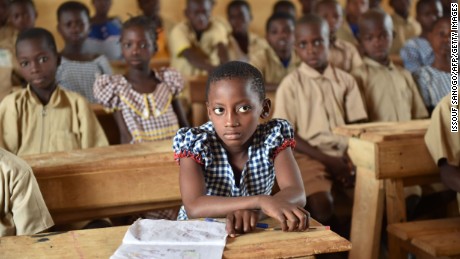 "You're achieving two things when you do this: you're making everybody including the men themselves recognize that you must take steps to promote the role of women in these positions, but also helping the young women understand that they can reach the top."
"You're achieving two things when you do this: you're making everybody including the men themselves recognize that you must take steps to promote the role of women in these positions, but also helping the young women understand that they can reach the top."
Original Article
It's a timely message. Many of Africa's youth are perishing, risking their lives in perilous journeys across the Sahara desert on their way to Europe. Some get stranded and die of thirst in the desert. Others fall into the hands of kidnappers who sell them into slavery in Libya, as a recent CNN investigation discovered. Twenty-six young girls, thought to be from Nigeria, recently died on a perilous crossing to Italy.October 2017
October 2017
A CNN team travels to Libya and witnesses a dozen men auctioned — some for as little as $400 each. The crew is also told of auctions taking place at nine locations in the country.
November 14, 2017
November 14, 2017
CNN publishes an exclusive report exposing how migrants are being sold by smugglers. In addition to alerting the Libyan authorities, CNN hands over footage as evidence to the International Criminal Court.
November 17, 2017
November 17, 2017
Libya opens an investigation into slave markets operating in the country following CNN's exclusive report. The probe is being overseen by the government's Anti-Illegal Immigration Agency. The International Organization for Migration (IOM), an intergovernmental organization based in Geneva that focuses on managing migration, welcomes Libya's investigation but warns that "the smuggling networks are becoming stronger, more organized and better equipped."
November 19, 2017
November 19, 2017

Protesters gather near the Libyan Embassy in central Paris to denounce the slave auctions and urge authorities to act quickly. Later that day, soccer star Paul Pogba celebrates his goal for Manchester United with a handcuff gesture highlighting the plight of migrants in Libya.
November 20, 2017
November 20, 2017

Alpha Conde, president of the African Union, and Federica Mogherini, the European Union's foreign policy chief, pledge in a joint news release to assist Libya in swiftly combating the issue of human traffickers.
November 20, 2017
November 20, 2017

UN Secretary-General Antonio Guterres says he is "horrified" by the reports of African migrants sold as slaves. He says the footage demonstrates some of "the most egregious abuses of human rights" and may amount to crimes against humanity.
November 21, 2017
November 21, 2017
The UN-backed Libyan Government of National Accord, or GNA, say they are keen to address violations against illegal immigrants but argued that the international community — and countries from which migrants travel — should also take responsibility.
November 21, 2017
November 21, 2017
A Nigerian official tells CNN that repatriation of migrants from Libya is not a straightforward procedure before adding that the Nigerian government is working with authorities in Libya and the IOM to speed up the process.
November 22, 2017
November 22, 2017
France's President Emmanuel Macron calls the practice of selling migrants as slaves "a crime against humanity" and vows to press for sanctions. France calls for an "urgent" meeting of the UN Security Council to discuss this treatment of migrants in Libya, Foreign Minister Jean-Yves Le Drian says.</a>
November 22, 2017
November 22, 2017
Diplomats at a UN Security Council meeting on human trafficking call for an investigation that would hold the perpetrators of slave auctions in Libya accountable. The council also adopts a resolution designed to clamp down on human trafficking and slavery.
November 22, 2017
November 22, 2017
Spain's foreign ministry expresses its "deep concern" over CNN's report. Spain urges Libya to follow the UN Convention against Transnational Organized Crime and its protocol on human trafficking, the Spanish Foreign Ministry posts on its official Twitter account.
November 23, 2017
November 23, 2017
African Union chairman Moussa Faki Mahamat tells CNN the situation in Libya is a "shared responsibility" that stems from the ensuing chaos after Moammar Gadhafi was ousted. He says that an AU representative has been sent to Libya to see what measures should be taken. Mahamat says he has asked the African commission on human rights to open an investigation so "concrete steps (can) be taken."
According to Oxfam International, 80,000 to 150,000 people made their way across the harsh northeastern Niger zone of the desert to Europe in 2015. Around 71,000 migrants made it to Europe by sea just five months into 2017, a UN Migration Agency report said. The migrants all have one thing in common: they search for greener pastures elsewhere when home holds no hope. Masiyiwa, the founder and CEO of Econet Wireless, a pan-African telecoms company, is putting his money where his mouth is by traveling across the continent in a series of townhalls where he directly connects and engages with young people.
Masiyiwa, the founder and CEO of Econet Wireless, a pan-African telecoms company, is putting his money where his mouth is by traveling across the continent in a series of townhalls where he directly connects and engages with young people.  At one townhall held in Lagos, Nigeria in September, Masiyiwa was so taken with one young entrepreneur's business idea that he donated $100,000.
At one townhall held in Lagos, Nigeria in September, Masiyiwa was so taken with one young entrepreneur's business idea that he donated $100,000.
Responding to the crisis
"I believe sharing ideas with each other is so important to the future of the African continent," Masiyiwa — who is worth an estimated $280m — says. By teaching young Africans to be self-reliant and proactive, the telecoms tycoon is encouraging them to stay in their countries and contribute to the development of the continent."I realized that if we don't do something to help young people create jobs in the African economy… that Africa's progress would be reversed.""I understand we face the problem of corruption, bribery, bad policies," he says. "But it doesn't mean you should take to crossing the Sahara or the Mediterranean.""We see the drownings… in the Mediterranean, young people trying to get to Europe," he adds. "So this is my own way as well to try to respond to that crisis which is to say, 'hey' to young people. 'Listen, let's do something. We can create jobs. You can be entrepreneurs, or you can work for entrepreneurs. You don't have to take this incredible risk.'"
Most influential business leader on Facebook
Masiyiwa has taken his message directly to the youth by mentoring and influencing entrepreneurs on Facebook. He started posting business insights on Facebook after his daughter encouraged him to share some advice he gave her with a larger audience.Today, Masiyiwa has nearly three million followers on the platform and for 12 consecutive months he ranked as the most influential business leader on Facebook, according to social monitoring platform Crowdtangle.From how to spot new business opportunities to how to manage successful businesses or survive the challenges of running one, his Facebook posts propose practical new ways of dealing with entrepreneurial challenges in Africa.He posts once a week on average and tries to respond to as many comments as possible."Every comment that I select, I answer as though the person were in my office," he says. An average post on his Facebook page has over one million likes and thousands of comments and shares."I read the thousands of comments myself, and try to engage back directly as much as my schedule allows," Masiyiwa says. "I write every post myself. I'm very prayerful and contemplative about each post because I'm mindful of the fact that I am addressing the next generation of leaders."Masiyiwa and his wife Tsitsi are devout Christians who have committed a portion of their income to philanthropy and charitable giving. This includes the Higher Life Foundation which pays tuition for thousands of orphans and vulnerable students, according to the website. In 2012, he set up a $6.4 million trust to send at least 40 African undergraduates to Morehouse College in Atlanta, over a four-year period. The couple have also collaborated with Yale University to sponsor 900 students who will attend the Yale Young African Scholars Program for three years.
An average post on his Facebook page has over one million likes and thousands of comments and shares."I read the thousands of comments myself, and try to engage back directly as much as my schedule allows," Masiyiwa says. "I write every post myself. I'm very prayerful and contemplative about each post because I'm mindful of the fact that I am addressing the next generation of leaders."Masiyiwa and his wife Tsitsi are devout Christians who have committed a portion of their income to philanthropy and charitable giving. This includes the Higher Life Foundation which pays tuition for thousands of orphans and vulnerable students, according to the website. In 2012, he set up a $6.4 million trust to send at least 40 African undergraduates to Morehouse College in Atlanta, over a four-year period. The couple have also collaborated with Yale University to sponsor 900 students who will attend the Yale Young African Scholars Program for three years.
Raising a generation of women leaders
In a continent where equality between men and women is yet to be attained, Masiyiwa is also leading by example by empowering women and appointing them to leadership roles in his businesses, a decision he says is inspired by the type of world he wants for his four daughters.  "You're achieving two things when you do this: you're making everybody including the men themselves recognize that you must take steps to promote the role of women in these positions, but also helping the young women understand that they can reach the top."
"You're achieving two things when you do this: you're making everybody including the men themselves recognize that you must take steps to promote the role of women in these positions, but also helping the young women understand that they can reach the top."
Original Article











